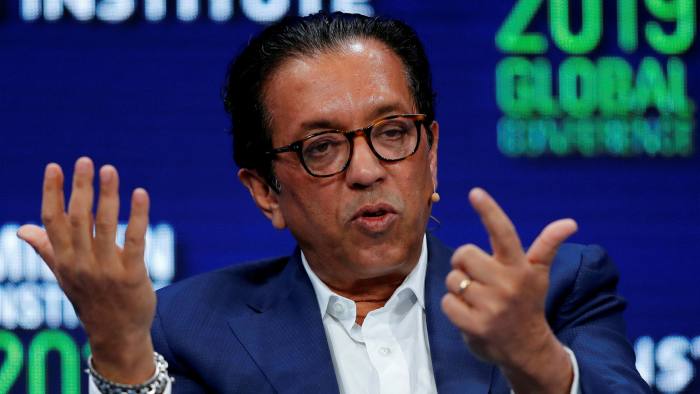
SoftBank investment chief given 113% pay rise despite Vision Fund woes
Ex-Deutsche trader Rajeev Misra earns $15m even after historic losses at Japanese tech group
by Kana InagakiThe head of SoftBank’s $100bn Vision Fund has been awarded a 113 per cent rise in last year’s pay despite overseeing an $18bn value destruction of its investments.
Rajeev Misra, a former Deutsche Bank debt trader who heads the Saudi-backed fund, received $15m for the year that ended in March, compared with $7m in the previous year, according to a notice SoftBank sent to its shareholders.
During that period, the Japanese technology group suffered a historic loss because of the implosion of WeWork and coronavirus hits to the fund’s major bets, including the ride-hailing company Uber and hotel chain Oyo.
The fund’s dismal performance has forced SoftBank to halt major new investments and scale back its ambitions for a second megafund after failing to raise money from external investors. Its founder Masayoshi Son has also warned that the group may not be able to pay dividends for the current financial year.
Several employees expressed shock following the disclosure of Mr Misra’s pay on Friday, questioning the logic of Mr Son’s decision at a time when the London-based fund has already been the source of instability, power struggles and governance issues.
Kirk Boodry, a tech analyst at Redex Holdings who publishes on research platform Smartkarma, said the high pay was likely linked to the amount the Vision Fund has deployed, totalling more than $85bn in 88 companies. Still, he added his compensation could be another source of investor pressure for Mr Son.
SoftBank declined to comment on its reasoning behind executive remuneration.
Among the five other board members whose pay was disclosed, Marcelo Claure, the chief operating officer, was the highest paid with ¥2.1bn ($19.6m), a 17 per cent increase from the previous fiscal year. Mr Claure, who orchestrated the merger of US carrier Sprint with T-Mobile, was also appointed chairman of WeWork last year to oversee the turnround of the lossmaking property group.
The only other director awarded a pay rise, of 13 per cent, was Katsunori Sago, SoftBank’s chief strategy officer and a former Goldman Sachs banker, who received ¥1.1bn.
Meanwhile, Mr Son, Japan’s second-richest man, was at the bottom of the list with a pay cut of 8.7 per cent to ¥209m. Ken Miyauchi, the head of SoftBank’s domestic telecoms business, received a 43 per cent pay cut despite delivering steady profits and revenue.
SoftBank vice-chairman Ron Fisher, who used to sit on the WeWork board before it fell into a crisis, saw a 79 per cent drop in pay.
The market meltdown caused by the coronavirus outbreak has forced SoftBank to compile an emergency plan to sell $41bn of assets to fund the largest share buyback in Japanese history and pay down its enormous debt load.